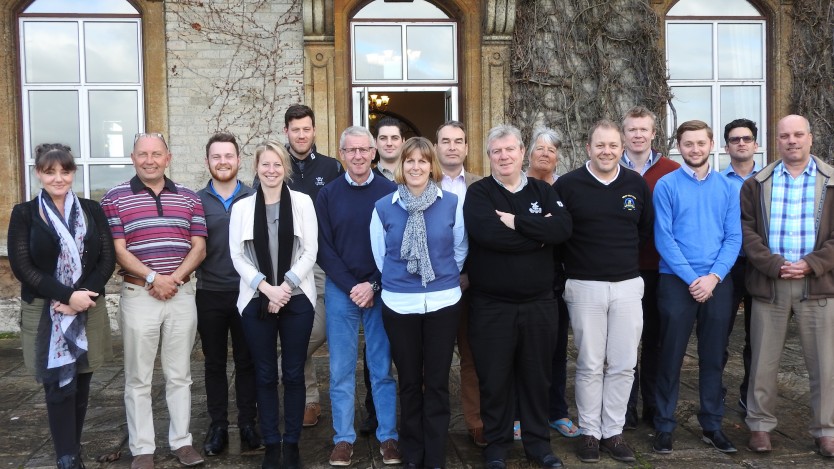“I have no previous experience in working in a golf club, therefore I thought it necessary to enrol in all relevant courses,” commented Richard Rowledge from Corhampton Golf Club, and one of the delegates from the recent March training course in Gloucester. From the likes of soon to be golf club secretaries to those considering a career in golf club management, or those already in post at a golf club, the course welcomed varying levels or experience.
I had the pleasure of sitting in on one day out the five day Introduction to Golf Club Management training course.
8:30am
The day started early to accommodate a busy schedule of guest speakers and designated study time. After breakfast and liberal amounts of coffee, Karen Drake commenced the day on the topic of finance. As manager of Burnham and Berrow Golf Club and South West Regional Manager, with a background in banking, Karen’s presentation was replete with personal experiences and best practice. She frequently turned to the floor and asked delegates about their own experiences and opinions. This was on great and small matters such as hiring external accountants and counting money, providing a great debate space for everyone to share and understand one-another’s financial processes and checks.
10:45am
With thirsts quenched after a coffee break, Joe Kelly Business Relationship Officer at the PGA commenced with his session on the Role of the PGA Professional. The two-hour presentation was great at clearing up past misconceptions around the PGA Professional and setting in motion the next steps in creating a stronger and more cohesive relationship between the modern professional and the club manager.
This session was one of the more heated of the day’s topics, due to some perceptions surrounding “old school” professionals, as well as the rift of awareness of this history between the new and existing club managers in the room. Being day four out five, you could tell the delegates had bonded because some brilliant discussions ensued, on matters such as: knowing what you as a manager want when recruiting a PGA pro in the 21st Century, to the improvement of communication between the PGA pro and the golf club manager regarding business plans and pathways, education, and remuneration.
One delegate’s golf club didn’t employ a pro, whilst another who was new to his position in the golf club was perplexed that the new methods presented on communication between the pro and the manager were not already common-sense business models.
12:30pm
With time speeding away, Niki Hunter Education Co-ordinator at the GCMA, briefly ran through GCMA’s Diploma in Golf Club Management before lunch with a very welcoming reception of interest.
You can usually rate the impact or controversy of each session by the hot-topic circulating at lunch, and Joe Kelly’s presentation on the Role of the PGA Professional definitely got some people talking. Over a selection of hot and cold foods with a big slab of cheesecake for pudding, they openly chatted about how the PGA Pro works at their own club, issues they have or don’t have and light-heartedly questioned one-another about the reasons behind their decisions.
Spare time at lunch was also utilised by a number of delegates finding a quiet corner and working on the tasks Niki had designated them at the beginning of the week. Real-life case studies from golf clubs were assigned one per small group with closing questions, with findings to be presented back to the group at the end of the week.
1pm
The group got comfortable, readying themselves for an afternoon on the important topic of Club Governance & Strategic Planning. Jerry Kilby, Club Manager at Bramley GC, is a wealth of knowledge when it comes to providing practical advisory services on implementing best practice across the role of golf club management. Jerry laid the groundwork from the get-go on what governance really meant: How are decisions made at golf clubs and how should they be made? He continued to present a well-structured and in-depth presentation with five key sections that covered everything from business models to management committee and a step-by-step guide on composing a strategic plan.
One key concept that ran through his presentation was the practice of ‘nudging’, and one that really interested the delegates. In short, ‘The Nudge’ is the process a club manager would follow when trying to influence a Board member or an ineffective Board of Directors. Delegates were enthralled to learn that there is a way to influence and persuade the decisions made by the Board by nudging them over time to their way of thinking. Jerry expanded on how and when this can be done and the correct way it should be undertaken to achieve results. It is no surprise to say that the delegates listened intently.
With a couple of closing comments: “I thought the course was excellent from start to finish,” from Rachel McAlpine, pursuing the idea of working part-time in golf club management, and Richard Rowledge, “The course was relevant and the topics covered were pitched at the right level. The quality, depth of knowledge and presentations of the guest speakers were all of a very high standard,” I headed home and left them to enjoy a little bit of down time before their last supper.
Find out more about the GCMA Introduction to Golf Club Management training course – the next course takes place in Henley-in-Arden in October.
By GCMA



